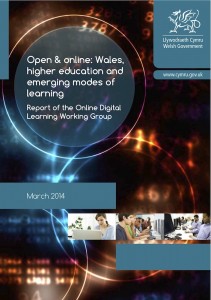Last week the Welsh Government’s Online Digital Learning Working Group published their report Open and Online: Wales, higher education and emerging modes of learning. The group was established in February 2013 by Leighton Andrews AM, the Welsh Government’s Minister for Education and Skills at the time,
“to examine the potential for online digital learning and how the Welsh Government can support the higher education sector in this growing field.”
 Paul Richardson of Jisc RSC Wales acted as professional advisor to the group and undertook the consultation exercise. The report includes an invaluable background paper produced by Paul on Open and online resources: implications for practice in higher education institutions in Wales, which provides an invaluable overview of recent open education developments including OER and MOOCs, and quotes from a number of Cetis blogs and publications. Although Paul’s paper focuses on the implications of open education for Welsh HEIs I can also highly recommend is as an excellent general summary of recent developments open education policy, practice and technology.
Paul Richardson of Jisc RSC Wales acted as professional advisor to the group and undertook the consultation exercise. The report includes an invaluable background paper produced by Paul on Open and online resources: implications for practice in higher education institutions in Wales, which provides an invaluable overview of recent open education developments including OER and MOOCs, and quotes from a number of Cetis blogs and publications. Although Paul’s paper focuses on the implications of open education for Welsh HEIs I can also highly recommend is as an excellent general summary of recent developments open education policy, practice and technology.
The report itself includes the following of seven recommendations addressed to the Minister for Education and Skills and higher education institutions.
To the Minister for Education and Skills
1. Widening access to higher education to those with low participation backgrounds.
Fund the development of O&O resources for use in schools and colleges, with the aim of raising aspirations of learners from low participation backgrounds. This scheme should be co-ordinated through collaboration between HEIs and schools and colleges in their region, via existing Reaching Wider Partnership networks.
Investigate the use of Hwb as a host for the O&O resources developed, with the intention of establishing a central repository where all schools and colleges may access these resources.
Extend the work of the Open University OpenLearn Champions project to cover the whole of Wales via the Reaching Wider Partnerships.
Liaise with NIACE Dysgu Cymru, Agored Cymru, and others to align O&O resource production with the needs of adult learners pursuing agreed progression routes, including CQFW.
2. Developing skills for the workplace and the Welsh economy
Develop a strategy, working with other agencies, to raise awareness of the potential for online learning to support economic development.
Use the Welsh Government’s sector panels to foster dialogue between stakeholders (including educational providers and employers) in order to identify opportunities to develop skills using online resources.
Examine how online learning should be integrated into the approach for programmes funded through the European Social Fund.
3. Developing Welsh language skills for employment
Develop a Welsh language skills MOOC at higher education level so that students and work-based learners can develop their professional Welsh language skills and potentially seek certification for those skills.
To the higher education institutions
4. Reviewing institutional policies, monitoring developments and exploiting opportunities
Agree what the institution’s overall approach to open and online resources should be, monitor external O&O developments, and exploit opportunities to produce and use resources.
5. Strengthening institutional reputation and brand
Exploit open and online resources in appropriate circumstances to showcase the quality of learning opportunities.
To the Minister and the higher education institutions
6. Improving the skills of higher education staff
Institutions should provide academic staff with the skills and support they need to make most effective use of open and online approaches to learning.
HEFCW should continue to contribute to the costs of Jisc’s programme on open and online resources and take advantage of Jisc’s expertise.
HEFCW and the Higher Education Academy should take a lead on this agenda.
7. Licensing and sharing open educational resources
The Welsh Government should encourage the systematic adoption of open licensing for open educational resources produced by HEIs in Wales
Where possible staff and institutions should release open educational resources using an appropriate Creative Commons licence
Institutions should make open educational resources widely available, including via the Jorum repository.
Taken together with Welsh HEIs recent statement of intent to work towards the principals of open education, the publication of this report represents another important step forward for open education in Wales and provides inspiration for Open Scotland to continue raising awareness of open education policy and practice at senior management and government level.
The Open and Online report can be downloaded here and Andrew Green, chair of the Online Digital Resources Working Group has written an introductory blog post here MOOCs and other animals: ‘open & online’ report published

